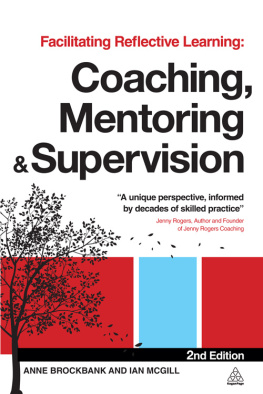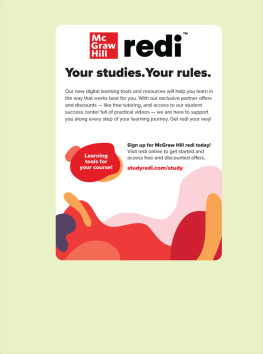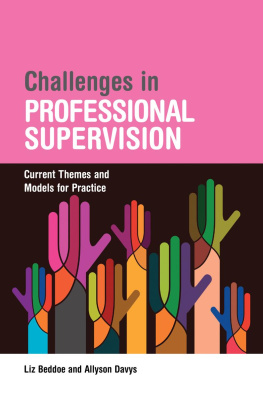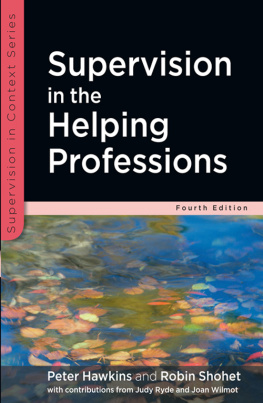A Practical Guide to Transformative Supervision for the Helping Professions
Amplifying Insight
Nicki Weld
Foreword by Jan Fook
Jessica Kingsley Publishers
London and Philadelphia
First published in 2012
by Jessica Kingsley Publishers
116 Pentonville Road
London N1 9JB, UK
and
400 Market Street, Suite 400
Philadelphia, PA 19106, USA
www.jkp.com
Copyright Nicola Weld 2012
Foreword copyright Jan Fook 2012
All rights reserved. No part of this publication may be reproduced in any material form (including photocopying or storing it in any medium by electronic means and whether or not transiently or incidentally to some other use of this publication) without the written permission of the copyright owner except in accordance with the provisions of the Copyright, Designs and Patents Act 1988 or under the terms of a licence issued by the Copyright Licensing Agency Ltd, Saffron House, 610 Kirby Street, London EC1N 8TS. Applications for the copyright owners written permission to reproduce any part of this publication should be addressed to the publisher.
Warning: The doing of an unauthorised act in relation to a copyright work may result in both a civil claim for damages and criminal prosecution.
Library of Congress Cataloging in Publication Data
Weld, Nicki.
A practical guide to transformative supervision for the helping professions
: amplifying insight / Nicki Weld ; foreword by Jan Fook.
p. cm.
Includes bibliographical references and index.
ISBN 978-1-84905-254-2 (alk. paper)
1. Supervision. 2. Transformative learning. 3. Leadership. I. Title.
HM1253.W45 2011
361.00683--dc22
British Library Cataloguing in Publication Data
A CIP catalogue record for this book is available from the British Library
ISBN 978 1 84905 254 2
eISBN 978 0 85700 541 0
Converted to eBook by EasyEPUB
To Auntie Qona
(Qona Crawshaw 19162009)
who was bold and never gave up
Foreword
Supervision is becoming of increasing importance in the global environment. Where there is economic pressure to compete for resourcing, and for services to become more efficient, justifiable, and effective, in public terms, there is a corresponding call for more interventionist management practices.
Supervision thus becomes a political site, where the often competing demands for managerial accountability, professional support and development are often played out in interpersonal interactions between supervisors and frontline workers. This micro level of practices is thus increasingly significant in terms of how globally affected policies are enacted and possibly transformed.
It is therefore timely to see a book which addresses the transformative potential of supervision. Weld draws appropriately on contemporary frameworks, such as relational social work and narrative approaches, to weave an approach to supervisory practice which seeks to rise above purely material, technical and bureaucratic motivations for supervision. She manages to carve out an image of supervision that aspires to self and professional development which largely transcends these possibly more transient concerns.
It is a well written work, drawing on a wealth of experience, and disparate but inspiring sources, to provide a picture of supervision which provides learning for both supervisor and supervisee. It will make readers think again about what they are expecting to provide in, take to, and take away from, supervision.
Jan Fook Director, School of Social Work, Dalhousie University, Nova Scotia, Canada
Introduction
It is not the end of the physical body that should worry us. Rather, our concern must be to live while were alive to release our inner selves from the spiritual death that comes with living behind a faade designed to conform to external definitions of who and what we are.
Elizabeth Kubler-Ross (19262004) (1986, p.164) (used with kind permission of the Elizabeth Kbler-Ross Foundation)
I have been providing supervision for the past 15 years, mostly within a social work context, and believe that the time has come for supervision to further advance by becoming more dynamic in purpose and function.
Most supervisors are now clear about the purpose of supervision, contracting, how to structure a session, setting an agenda, managing challenge, and working from reflective practice models. In this book, I am interested in exploring how supervision can become more transformative as a way of amplifying insight to contribute to positive professional and personal change. We must approach exploring and applying transformative supervision from the key principles of respect, dignity, kindness, and integrity, and always from the place that what we do as supervisors is in the best interests of the practitioner and ultimately those whom they serve.
First I need to openly name my own philosophical motivation and possible bias behind exploring transformative change as a function of supervision. I see my life purpose as fundamentally about learning to support the development of awareness, knowledge, and self actualisation. As Pierre Teilhard de Chardin expressed in his work The Phenomenon of Man (1955, translated into English 1959), human beings are challenged to learn through physical, biological and spiritual processes that increase consciousness. It is through these processes that we truly awaken to our own divinity and embrace our capacity for transformation and contribute to evolution. The key to this is about learning, and I believe that as human beings the place where we most often learn is within relational contexts. It is through our interactions with others that we learn a great deal about ourselves, other people, and the world that we share. If we have chosen to put ourselves directly in the pathway of relational experiences through being in work that is of service to others, then we have a responsibility to be always reflecting and opening ourselves to the learning that this brings. Learning is about ways of enhancing and expanding our analytical and intuitive knowledge base that in turn increases the potential for professional and personal development.
Being prepared to be involved in this type of continuous insightful learning is what enables our true selves to be most evident in everything we do. It is through openness and honesty that we truly connect to others, and supervision, through being a protected relational space, is naturally a part of this. If we embrace supervision as a place of learning we have nothing to fear from it. The possibilities of expansion and self actualisation (being psychologically whole or complete) become an exciting journey that we can engage in to support positive change in ourselves and our world. Marsha Sinetar in her book Ordinary People as Monks and Mystics talks about our own growth as containing two co-existing and equally necessary elements: self knowledge (knowing who the self within us really is and awakening to the values, needs and wants of that self), and the ability to act out that real self in our lives (1986, p.14). Our growth is about paying attention, developing awareness, and using this to translate into expanded and enhanced knowledge.








